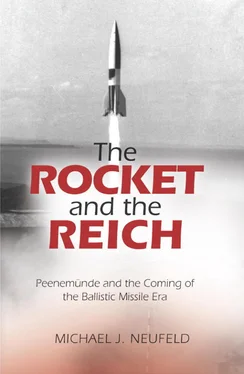Michael Neufeld - The Rocket and the Reich
Здесь есть возможность читать онлайн «Michael Neufeld - The Rocket and the Reich» весь текст электронной книги совершенно бесплатно (целиком полную версию без сокращений). В некоторых случаях можно слушать аудио, скачать через торрент в формате fb2 и присутствует краткое содержание. Город: Washington, Год выпуска: 2013, ISBN: 2013, Издательство: Smithsonian Books, Жанр: История, military_weapon, на английском языке. Описание произведения, (предисловие) а так же отзывы посетителей доступны на портале библиотеки ЛибКат.
- Название:The Rocket and the Reich
- Автор:
- Издательство:Smithsonian Books
- Жанр:
- Год:2013
- Город:Washington
- ISBN:978-1-58834-466-3
- Рейтинг книги:3 / 5. Голосов: 1
-
Избранное:Добавить в избранное
- Отзывы:
-
Ваша оценка:
- 60
- 1
- 2
- 3
- 4
- 5
The Rocket and the Reich: краткое содержание, описание и аннотация
Предлагаем к чтению аннотацию, описание, краткое содержание или предисловие (зависит от того, что написал сам автор книги «The Rocket and the Reich»). Если вы не нашли необходимую информацию о книге — напишите в комментариях, мы постараемся отыскать её.
The Rocket and the Reich — читать онлайн бесплатно полную книгу (весь текст) целиком
Ниже представлен текст книги, разбитый по страницам. Система сохранения места последней прочитанной страницы, позволяет с удобством читать онлайн бесплатно книгу «The Rocket and the Reich», без необходимости каждый раз заново искать на чём Вы остановились. Поставьте закладку, и сможете в любой момент перейти на страницу, на которой закончили чтение.
Интервал:
Закладка:
The solution arrived at by Becker and the Army leadership was to convince Hitler of the value of the rocket program by giving him a demonstration. Blinded by the Führer cult that reached new heights after the Munich agreement and by Hitler’s increasing control over the military, the Army generals sought a “Führer order” emphasizing the priority of missile development. On a rainy day in March 1939 von Brauchitsch brought Hitler to Kummersdorf, which was only a short distance from Berlin. (The Supreme Commander never set foot in Peenemünde.) The two were accompanied by Becker and were met by Dornberger, Thiel, and von Braun. The Führer saw firings of the 300- and the 1,000-kg-thrust motors, with their ear-splitting roar and impressive exhaust jets, but his expression scarcely changed. When von Braun explained the workings of the liquid-fuel rocket using a cutaway A-3, Hitler listened closely but then walked away, shaking his head in incomprehension. A test stand demonstration of the A-5’s guidance system in action left him similarly unmoved. Finally Dornberger described the A-4 to the Führer in a smaller, closed circle. During lunch afterward, Hitler gave the group only a backhanded compliment: “Well, it was grand!” He went on to describe his acquaintance with Max Valier in Munich a decade before but wrote him off as a “dreamer.” 13
To Dornberger, the “whole visit seemed… strange, if not downright unbelievable.” Previous witnesses to rocket firings, he claims, had all been “enraptured, thrilled, and carried away by the spectacle,” just as Göring would be a few weeks later. Yet Hitler had seemed singularly unimpressed. That did not prevent Dornberger from referring on March 31, in a request for more construction labor, to the Führer’s alleged command to finish the Peenemünde Production Plant in four years. By seizing on “a brief nod” Hitler had given to his description of the A-4’s development period, the chief of Wa Prüf 11 showed the instincts of good Third Reich politician. A “Führer order” was often just a passing comment by Hitler exploited for the purposes of whoever was present. But the net effect of the Kummersdorf visit was precisely zero: It neither hurt the rocket program nor helped it. The buildup of the development organization at Peenemünde continued apace; the planning of the production facility proceeded unchanged, but there were few construction workers available to do the work. Not until after the outbreak of war would there be significant changes, both positive and negative. 14
THE BATTLE FOR PRIORITY BEGINS
On September 5, 1939, two days after the British and French declarations of war and one day after the announcement of full economic mobilization, Dornberger and Becker saw von Brauchitsch at Army headquarters in Zossen, near Kummersdorf. Military callups threatened to drain Peenemünde of manpower. At the meeting von Brauchitsch signed an order, apparently drafted by Dornberger in advance, that the “Peenemünde Project (Army Experimental Center, Production Plant and Construction Office) is to be pushed forward with all possible means as particularly urgent for national defense.” It was hoped that this decree would forestall the loss of further important people, especially skilled workers, to military units. 15
General von Brauchitsch demanded something in return for his protection. The construction of the factory and the development of the A-4 were to be accelerated so that missile production could begin in September 1941 instead of the projected date of 1943. Presumably that was the earliest date Dornberger thought possible, but it was still a risky gamble. From now on, the program would be carried out under the pressure of unrealistic deadlines imposed for political reasons. The Army Commander-in-Chief probably wanted to make the missile project defensible as one that would produce results soon enough to affect the course of the war. 16
Von Brauchitsch issued the order guaranteeing Peenemünde’s priority without consulting either Hitler or the Armed Forces High Command (OKW), just as he had done with his November 1938 order for the Production Plant. His accelerated schedule meant that missile production would have to begin at least two years earlier than planned, which in turn implied rounding up thousands of new construction workers in a labor market even tighter than before the war. Yet in 1939, as in 1938, the Army Commander-in-Chief assumed that he had the power to proceed without consulting anyone. Only afterward, on September 15, was a priority order obtained from the OKW Economics Office. 17
There was, in fact, no coherent priority system in Germany before the summer of 1940. Hermann Göring, as head of the Four-Year Plan set up in 1936 to prepare the nation for war, was allegedly the Third Reich’s “economic dictator,” but he lacked the time and competence to carry out his huge task while simultaneously acting as Commander-in-Chief of the Luftwaffe. The Economics Minister, Walter Funk, was a Nazi Party lightweight and creature of Göring who controlled the civilian economy. General Georg Thomas, who headed the OKW Economics Office, officially controlled military production and priority. His concept was to pick up where the Army leadership had left off in 1918 and use his national network of armaments inspectors to impose a stifling military control on industry. That divisive and confused situation resulted in a botched mobilization of the war economy and what General Thomas called, as early as October 1939, “a war of all against all.” To top it off, Hitler’s personal tri-service staff, the OKW, was headed by the subservient General Wilhelm Keitel, who received little respect from the service commanders. 18
For the moment, however, the Ordnance rocket group remained unaware of the storm that was brewing as a result of the prevailing disorganization and inefficiency. On October 11 Thomas presented for Göring’s signature a priority order for construction in an attempt to sort out the services’ incompatible demands for labor and resources. In order to keep all three armed forces happy, Thomas put the Army’s Peenemünde project, the Navy’s U-boats, and the Luftwaffe’s aircraft production program together in the first rank. Göring issued the order, but it had little effect. Thomas later commented on the services’ “construction mania” in the fall of 1939, a phenomenon in which Army Ordnance was a full participant. On October 9 Becker had asked for a further acceleration of the A-4 schedule, perhaps because of the quick victory over Poland, with a goal of completing the Production Plant by May 31, 1941. Nine thousand construction workers would be required for Peenemünde. By mid-November there were already five thousand on the island, including those working for the Luftwaffe. So many workers had arrived so suddenly that housing, cooking, and sewage facilities were strained to the breaking point. 19
Meanwhile, a number of steps were taken to meet the urgent new deadlines for A-4 development. One was to open the research process to university institutes. Another was to eliminate or postpone less important projects, particularly the interservice rocket-aircraft program. The Luftwaffe had itself canceled the pure-rocket Heinkel He 176 on September 12, because it was too small and its performance was disappointing. The airplane had first flown with a Walter hydrogen-peroxide motor on June 20, but its speed, stability, and endurance were poor. A second He 176 using the Army’s liquid-oxygen/alcohol system was under construction but was brought to an abrupt halt by the Luftwaffe order. What remained of the joint aircraft program was only the He 112 with the redesigned Army rocket engine in its tail. Since it had been finished and delivered to Peenemünde-West in June, it required little attention from the eastern side of the complex. The aircraft flew until June 1940, when it crashed, killing the pilot. Thus all that was really left of the Army-Luftwaffe rocketry alliance was the collaboration in guidance technology fostered by Steinhoff, plus the project to build a liquid-oxygen/alcohol takeoff-assist system for heavily loaded bombers. Cooperation had reached a new low, but that was entirely in keeping with the desire of both services to focus on more critical projects after the start of the war. 20
Читать дальшеИнтервал:
Закладка:
Похожие книги на «The Rocket and the Reich»
Представляем Вашему вниманию похожие книги на «The Rocket and the Reich» списком для выбора. Мы отобрали схожую по названию и смыслу литературу в надежде предоставить читателям больше вариантов отыскать новые, интересные, ещё непрочитанные произведения.
Обсуждение, отзывы о книге «The Rocket and the Reich» и просто собственные мнения читателей. Оставьте ваши комментарии, напишите, что Вы думаете о произведении, его смысле или главных героях. Укажите что конкретно понравилось, а что нет, и почему Вы так считаете.












